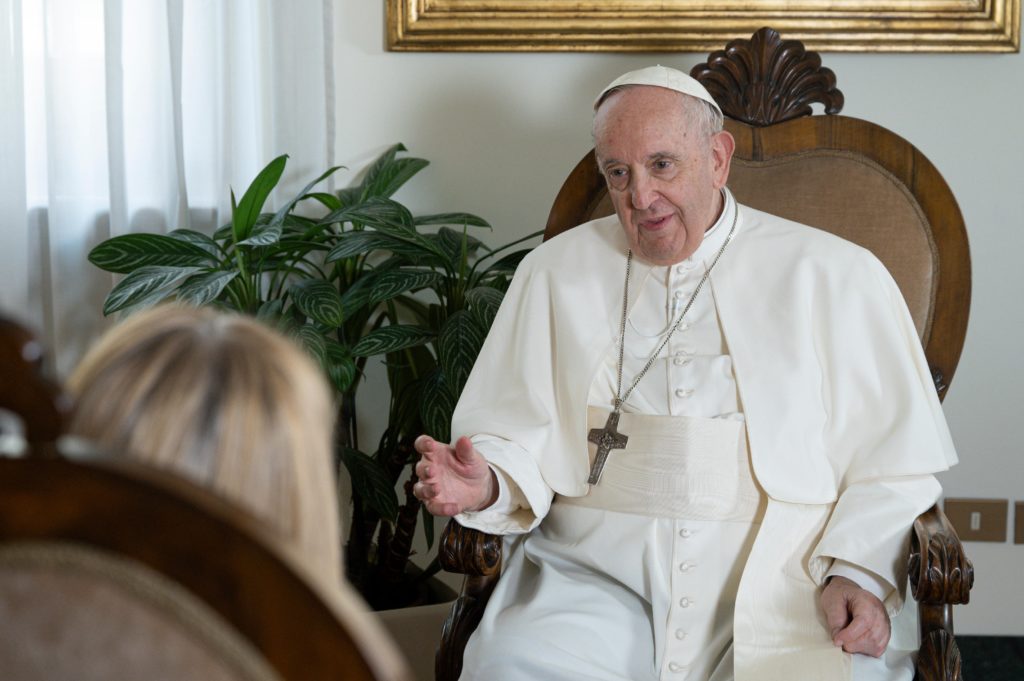In the fourth century, St. Augustine became the first strong, Christian proponent of the theory of just war, which proposes a war can be morally justifiable in some cases because it might prevent an even worse situation. According to Pope Francis, however, the time has come to rethink that concept.
“I believe it is time to rethink the concept of a ‘just war’,” Francis said. “A war may be just; there is the right to defend oneself. But we need to rethink the way that concept is used nowadays. I have said that the use and possession of nuclear weapons are immoral. Resolving conflicts through war is saying no to verbal reasoning, to being constructive.”
Moving from war to “our daily behavior,” the pope said that “when you are talking to some people, they interrupt you before you have finished. We don’t know how to listen to one another. We don’t let people finish what they are saying. We must listen. Receive what they have to say. We declare war in advance, that is, we stop dialoguing. War is essentially a lack of dialogue.”
The Argentine pontiff has increasingly questioned the idea of a just war. As it stands, the Catechism of the Catholic Church, which summarizes church teachings, states that there are strict conditions for legitimate defense by the military: The damage inflicted by the aggressor on the nation or community of nations must be lasting, grave, and certain; all other means for ending the conflict have failed; there’s a serious prospect of success; and the use of arms cannot produce a graver evil than the one they are allegedly eliminating.
“These are the traditional elements enumerated in what is called the ‘just war’ doctrine,” according to the Catechism, and “the evaluation of these conditions for moral legitimacy belongs to the prudential judgment of those who have responsibility for the common good.”
Francis’s words came during a 90-minute interview with Telam, the news agency of the Argentine state, published on Friday. He was answering a question about lack of dialogue being an aggravating factor for a world that he believes is currently living a piecemeal Third World War.
The conflict in Ukraine, he said, comes very close to being a third global war, “so we are alarmed.” He also spoke of the conflict in Rwanda 25 years ago, the past decade of war in Syria and the “infighting” in Lebanon and Myanmar to support his theory of the world being at war, even if the conflict is not in one place.
“Unfortunately, war is daily cruelty,” he said. “War is not about dancing the minuet; it is about killing. And there is an entire structure for the sale of arms that favors it.”
In fact, he said, if the world halted weapons productions, for a year, “we could end world hunger.” He said he was quoting someone “who knows the statistics.”
Pope Francis also spoke about his 2014 visit to the World War I Memorial in Redipuglia, Italy, where “I saw the age of the dead and I cried.” When he went to the Anzio War Cemetery, once again, he cried seeing the age of “those dead boys.”
“I’m not embarrassed to say it,” he said. “And during the commemoration of the Normandy landings, I thought of the 30,000 boys who died on those beaches. Troops were ordered to storm the beaches, as the Nazis were waiting for them. Is that justified? Visiting the military cemeteries in Europe helps it dawn on you.”
The pontiff was also asked about multilateral organizations and their (in)ability to prevent wars, specifically the United Nations.
“After World War II, trust was placed in the United Nations,” he said. “It is not my intention to offend anybody; I know there are very good people working there, but at this point, the UN has no power to assert its authority. It does help to prevent wars.”
Francis also said that, without wanting to generalize, there are some “distinguished institutions” currently in crisis or even in conflict. Crisis, he said, can lead to progress, but without “courage and creativity,” no international institutions can overcome the ongoing “death situations.”
Ten years as pope
During the interview, Francis also reflected on the decade he has spent at the helm of the Catholic Church.
Nothing of what he has done, he said, was original, but a setting in motion of what was requested of the new pope during the pre-conclave meetings held in Rome following the resignation of Pope Benedict XVI in early 2013.
“Everything I have done was neither my invention nor a dream I had after a night of indigestion,” he said. “I picked up everything that we the cardinals had said at the pre-conclave meetings, the things we believed the new pope should do.”

